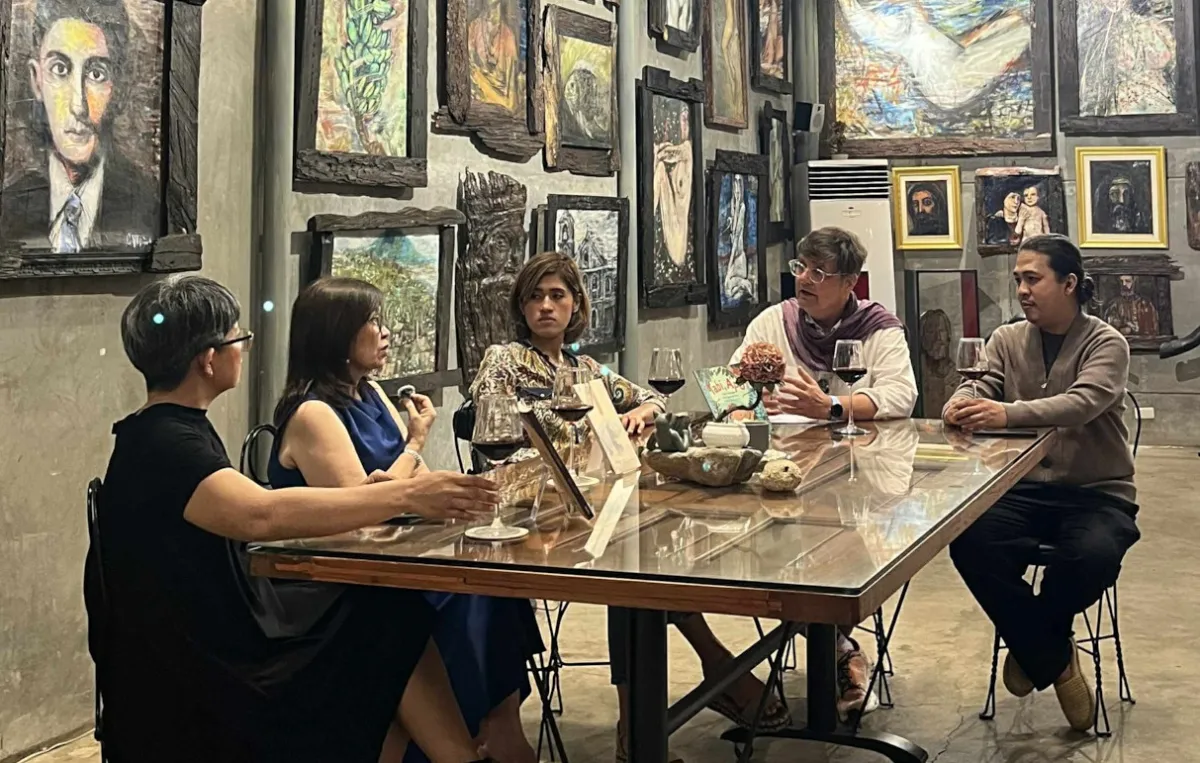Literary travel in the Philippines
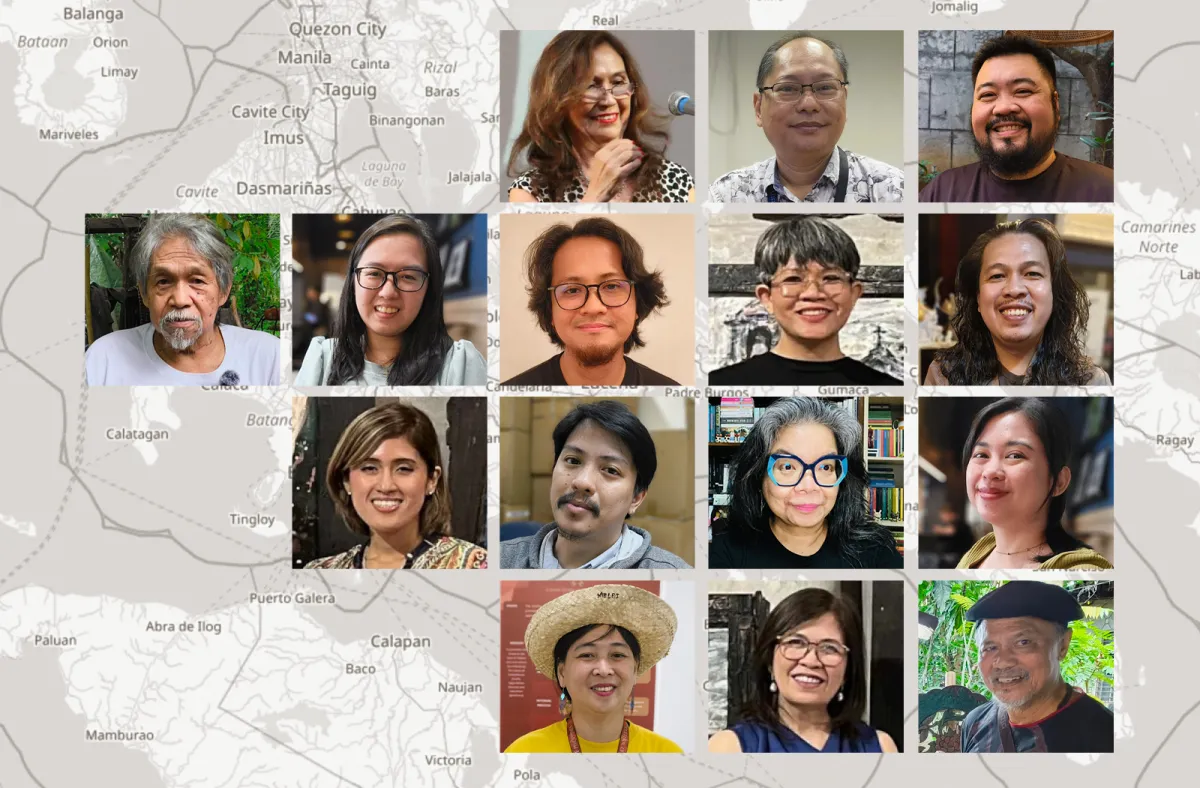
Foreword
Every reportage is more than just a text - it is the result of many hours of listening, observing and lingering. It emerges from conversations, from impressions that take shape between street noise, pauses and silences. But the finished text is always only an excerpt, a condensation of this experience, an attempt to distil a narrative form from the overabundance of reality. What remains is always less than it was. To avoid this limitation, I decided to take a different approach with this reportage: All the conversations on which it is based are also available as complete podcasts. They can be listened to independently of the text, in their own chronology and voice. This allows you to expand, deepen and review the narrative - on the right-hand side of this text or on our podcast overview page.
A happy girl
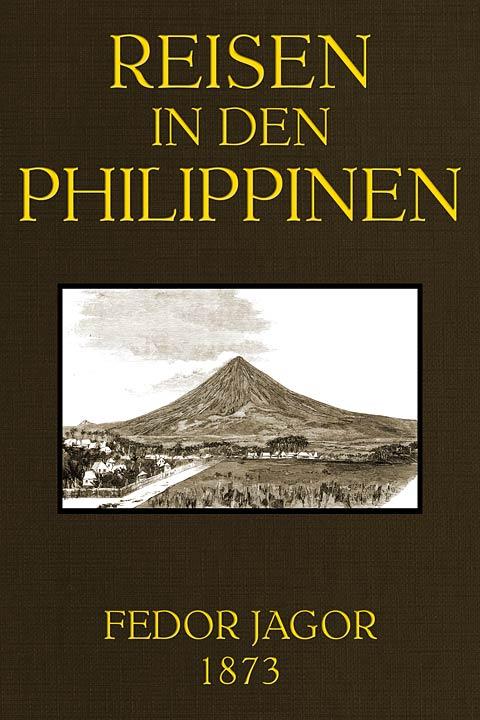 Projekt Gutenberg
Projekt GutenbergFedor Jagor | Travels in the Philippines | Project Gutenberg
Today, anyone reading Fedor Jagor's ethnographic report Travels in the Philippines, published in German in 1873, is likely to be astonished. For although Jagor repeatedly describes the "natives" as "immoral" in the style of the time, for example, in their "dissolute" morals - why work when you can win good money at cockfights? - he is also quite critical of the Spanish colonialists on his journey from Manila to Bikol, undertaken between 1859 and 1860. He recognises, for example, the strategy of "divide et impera" (divide and rule) so beautifully put into words by Machiavelli and implemented ruthlessly by every colonialist. It was through the use of language that the Spanish were particularly skilful in this, teaching Spanish only selectively to those who could be useful to the Spanish power apparatus - an apparatus that, despite its corrupt structures, is not rated especially highly by Jagor. But what can you do when you have to defend yourself against the aggressive influence of countries such as China and Russia? At least the regional power structures must function flawlessly.
This is particularly surprising because it sounds both so familiar and current. Travel in Jagor's footsteps through the Philippine today and you can still share some of his observations. And perhaps Jagor would even have relativised his opinion of the "natives" somewhat if he had met the literary (and revolutionary) father of the Philippines, José Rizal, as a child in the Philippines or as an adult during his studies in Germany. Indeed today, as then, a country's literature usually knows more about a country than the country itself; writers very often reveals the status quo of a society and often also its future. Which is why Jagor, after landing in Manila, would hardly have been comforted by the Spanish state apparatus and its ethnographic arithmetic, but - like me - would have gone directly from the airport to visit Bebang Siy at her workplace in the impressive grounds of the Cultural Centre of the Philippines, whose striking brutalist architecture forms an surprisingly harmonious symbiosis with the bay of Manila.
Writing for a change – A podcast with Bebang Siy
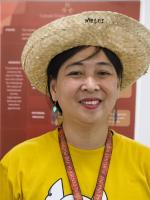
Her open-plan office, in a small adjacent building, looks no different from any other office in the world, and Siy's organisational work for state-sponsored cultural events also sounds familiar. We retire to the quiet archive with two colleagues, and Siy talks about her unusual coming-of-age as a writer. It is unusual because Siy grew up in a dysfunctional family in Manila's former red light district, Ermita. But, as she emphasises several times, she was also unusually lucky - not only as a child and teenager, but then also at university, where her professor allowed her to submit in lieu of a "normal" thesis, memories of her childhood in the form of essays or short stories, and encouraged her to send the manuscript to a publisher after submission, as these vignettes of everyday life were definitely ready for print. And that, too, was unusual, because until then there was really only Bob Ong, (a pseudonym), writing specifically about everyday life in the Philippines, and also- like Siy - in Filipino. This is still unusual today, despite the major state project to establish Filipino as an identity-forming indigenous lingua franca and national language, similar to Kiswahili in Tanzania or Bahasa in Indonesia. Even if this literature - like Siy's It's a Mens World - is successful and universal in character, as can be seen in the story Milk Shakes and Daddies from It's a Mens World, published on Literatur.Review. And because she herself has felt how her own writing has changed her life, Siy supports female writers wherever she can - the list of female authors she has compiled over the last few months speaks volumes.
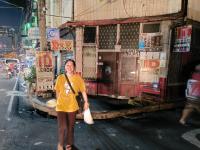
It's not far from her workplace to the marina, where couples can be photographed at sunset against a backdrop that makes you forget that just a few hundred metres further on, between modern high-rise buildings, lie honeycomb-like slums, which Siy draws attention to. And as we stroll in the dark through a gentrified Ermita, her old home, it becomes increasingly clear to me that since the revolution at the end of the 19th century and the American and Japanese occupation, colonial structures have not only been reproduced through language, but also through the more than 200 families, political dynasties that divided the country among themselves and about which, for example, the literary scholar Caroline Hau writes in her novel Tiempo Muerto. This is precisely why, Siy emphasises, we need a literature that makes us angry - one that mercilessly exposes these conditions, the interplay of corruption and nepotism.
We decide the future
Science fiction from Manila - podcast with Katrina F. Olan

The next day in the hip Latitude Bean+Bar over a matcha latte and Vietnamese iced coffee, young author Katrina F. Olan, who wrote a bestseller several years ago, her science fiction novel Tablay, now also a comic, also talks about this. She explains that although Marcos Junior, the son of the Philippines' dictator, who is also well-known in Europe, was elected to power in the last presidential elections in 2022, Gen Z showed in the last local elections that things can be done differently; numerous relevant families were voted out of office. Her novel, which she wrote during Duterte's time, is also - like so many science fiction novels - a political commentary. Olan's blending of traditional Filipino mythology and fairy tale characters with contemporary science fiction elements depicts, above all, a Manila of the future in which political revisionism, land theft and the displacement of indigenous cultures are answered with a radically composed strategy based on indigenous roots. Olan explains that Filipino literature is far too lacking in self-confidence, that it all too rarely considers the wider world in its writing. Yet it has what it takes - just look at the amazing comic grassroots movement in Manila or the Filipinos' unique sense of family, which also includes non-blood relatives and for which rituals such as the Bayanihan existed even before the colonial era. For Olan, who also has a successful career in marketing and implements the ideas of the Blue Ocean Strategy both in literature and in her work, robots, romance and revenge are more than just motifs - they are part of a future that is being decided in the present: We decide the future!
Love, Responsibility and Hope - A podcast with Angeli E. Dumatol

Chatting with me next is young adult and romance author Angela E. Dumatol, who also writes about self-determination. But more than the possibility of a self-determined future what interests her most is a self-determined present that shows one thing above all: for all the hardships faced by ordinary people in today's Philippines, the possibility of happiness must not be ignored. She expresses this happiness in her books for teenagers and young adults about traditional love stories. Although she is part of a group of authors and readers who discuss gender-fluid topics, she identifies as cisgender - and so do her novels. As a nuclear medicine doctor, she also incorporates her professional experience, for example in the story First Cut in the anthology The Doctor is in Love, which is initially about professional competition and ultimately about what is more important in life: love or career. Through her literature, however, she not only wants to convey the hope of a happy ending, but also make it clear that everyone has to take responsibility. And for this, the Philippines are well placed - as Olan has already pointed out, they are an exceptionally family-oriented society.
I was never particularly sociable
Between column and colonial mentality - A podcast with Jessica Zafra
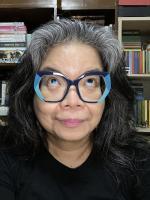
This familial society also has its pitfalls, as author Jessica Zafra, famous for her "Twisted" columns, tells us in her clever and wicked debut novel The Age of Umbrage. I meet Zafra outside one of Manila's major bookstores, the Fully Booked in Bonifacio Global City. It's half an hour by scooter from Latitude Bean+Bar to this far end of the metropolis. Once you leave the old part of Manila behind, with its buildings and streets that breathe the air of time and speed through this huge city, it doesn't seem like a mere half an hour, but worlds that you cross in their architectural diversity and their rich-and-poor hierarchies to end up on a planet that couldn't be more modern (or rich) - with sidewalks and promenades and security guards who point out nicely but firmly if you've parked your scooter incorrectly. We sit down in a café that is already serving Christmas specialties in August, which is not particularly surprising in the Philippines: even on the large overnight ferries that connect the islands, you can meet people in the huge dormitories in August who are already excitedly talking about buying their Christmas tree. Zafra, who carries cat food in a rucksack under the table to feed the stray cats in the district after our meeting, explains why her novel had to be set in the Marcos era. On the one hand, she is a "martial law baby", and on the other, the coming-of-age story of her young heroine is simply too good a way of highlighting the plight of the Philippines today. Like her character, she herself was not particularly sociable as a young girl. However, this has the advantage of dissecting the world a little more harshly than perhaps others do. Of course, a lot has changed since Marcos - for example, the middle class has empowered itself. But since the film industry is no longer doing so well, more and more film stars are going into politics - and that, in turn, is just terrible. As in her literary debut or the diaspora tale The Adventuress on Literatur.Review, she also takes a look at the diaspora dream in her new novel, yet to be published. It's a longstanding topic and one that few people are familiar with: the travels and study trips of Rizal and his friends in the 19th century, an important cornerstone of everything that subsequently happened politically and in literature in the Philippines. Zafra is painfully aware that the country is still divided along linguistic lines despite all the revolutions. Laughing bitterly, she says that the majority of the authors invited as guests of honour at this year's Frankfurt Book Fair also write in English. And she is just another example of this fact. When she read Allan Derain's Aswanglaut some time ago, she kept having difficulties understanding Derain's novel, which is written in Filipino.
Monolinguality is a shame
Myths, Language and the future - A podcast with Allan Derain
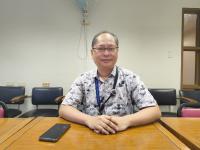
It's raining heavily the next morning when I hop on my scooter in a rather too-small raincoat, to meet Allan Derain. He teaches creative writing and Filipino at Ateneo University, where José Rizal also studied. The rain, the congested roads and some extremely treacherous roadworks just before the university dash almost all hopes of arriving at the campus in Katipunan on time, but with a few broken traffic rules I do manage to ask Derain my questions in a conference room shortly after eight. I am particularly interested in the coming-of-age of his unique literature, which can be read on Literatur.Review via the story Tungkong Langit + Alunsina. His ethnohistorical approach was taught to him during his studies by reading Barangay: Sixteenth-Century Philippine Culture and Society by William Henry Scott. Today, Derain emphasises, it is all the more important in times of climate change to re-imagine societies that are still in harmony with nature. And the complexity of ancient myths such as the Aswang myth - a demigod made up of numerous entities - is also something of a blueprint for our future. I can't help but think of Olan's Tablay, which reactivates the old myths in a completely different way and transfers them into a positive, albeit fictional, future. However, Derain explains, the reality is not quite so positive: the old myths have increasingly disappeared with Christianity and the construction of roads, because a demigod like the Aswang needs forests - and these are being desecrated. And then the bearers of the ancient myths themselves are also dying out: Babaylans, healers and shamans, and the singers of the old epics, whom Derain interviews to secure their knowledge.
While there are students I met beforehand who would rank a novel like Aswanglaut among the top ten of contemporary Filipino literature, Derain is under no illusions about this. The students at the Ateneo, who mostly come from urban, sheltered and English-speaking backgrounds, accept the Filipino courses for what they are: a tiresome compulsory course. It is difficult to convey that monolingualism is a disgrace and multilingualism an opportunity.
Beyond the floodwaters of Manila
At nine o'clock, when Derain's first classes begin, I am on my way back downtown to meet Chuckberry Pascual in a café in Malate, in the "old" Manila. But the rain is getting heavier and heavier, making Manila's canyon-like streets look more and more like the urban dystopia in Ridley Scott's Blade Runner. And at a certain point, nothing functions: the roads are so badly flooded that I have to park my scooter and wade through knee-deep water. A few weeks later, in September, 130,000 demonstrators in Manila will protest against these conditions - because the fact that the flood protection system doesn't actually exist is mainly due to corruption and mismanagement. The floods also scupper Pascual and we postpone our meeting until the following day.
At least the metro is running - and it's even free. It's the city's way of apologising for the misery, Bebang Siy explains to me with a laugh. We drive to Cavite, where she lives with her boyfriend, filmmaker and publisher Ronald Verzo. Beyond the floodwaters of Manila, this city, where on June 12, 1898 Emilio Aguinaldo proclaimed Philippine independence from the balcony of his house and became the country's first president, no longer feels like a lived dystopia, but like home. And even more so in Siy and Verzo's book -filled house, where two children romp around or play with their electronic gadgets, just like anywhere else in the world. In the evening, we talk at length about Verzo's "Grassroot Publishing": authors in remote regions or the diaspora are encouraged to write and in turn inspire those around them to write. As a result, Balangay Books has published completely different titles: Ausländer by Al Joseph Lumen, which describes the everyday struggles and quiet triumphs of Filipino migrants inside Germany; Pasasaan by Jesus Aman Calvario, which depicts the author's struggle with his schizophrenia; or Sa Ika-ilang Sirkulo ng Impiyerno by Miguel Paolo Celestial - a harrowing descent into the hell of addiction, queer desire and the struggle for survival. And, of course, the huge success of Bebang Siy's A Men's World.
Should we be more afraid of monsters or men?
Between Monsters and Humans - A podcast with Chuckberry Pascual
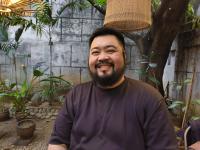
The following afternoon I make my way back to Manila, this time to Quezon City, with almost three million inhabitants, Manila's largest "neighbourhood". Chuckberry Pascual is already waiting in the Kandle Café, and over black matcha we quickly come to his extremely disturbing story Room 202, published on Literatur.Review, and his radical work, which - like Derain and Olan - amalgamates the old Filipino monster mythology of the Aswangs in a very contemporary and political way. And on the question of whether we should be more afraid of monsters or people in the current political transformations in favour of autocratic systems, Pascual explains that since Duterte, politics itself has divided families and that at parties - not unlike in the USA - politics is taboo, which is particularly tragic given the Philippine hymn to the family. Like Derain, Pascual also finds it difficult to convince his students at the University of the Philippines to write in Filipino and not just in English. The Americans were simply so much smarter than the Spanish during their brief colonial interlude: "Instead of withholding the language from us, they gave it to us." The consequences are still virulent today- not only is the constitution written in English, the courts also function in English - and then the government keeps putting pressure on people to learn the language of globalisation, even though most people would not even be able to defend themselves in court in their indigenous language. This is precisely why he tries to introduce his students to as much indigenous Filipino literature as possible, to show them that there are great thinkers and writers not only in the wider Anglophone world, but also at home. However, they did not always have an easy life either: Not only have books been banned and authors threatened under Duterte, but a poet was recently murdered because he was an avowed opponent of the government. But nevertheless, Pascual stresses, there is the other side of the coin: more authors and publishers than ever before - even if the number of readers is not quite as pleasing and 500 copies sold already have bestseller status. This is reminiscent of what Caroline Hau mentions in her dark novel Tiempo Muerto: that the most important books in the Philippines today are the Bible and cookbooks.
Something is terribly wrong
Writing between life and death - A podcast with Michael Beltran
Round the corner in the Half Saints Cafe, journalist Michael Beltran tells me more about the "declared opponents of the government" mentioned by Pascual than I would have liked. Especially as a journalist, he says, writing is less about truth or falsehood than about life and death - which seems plausible given the information gathered by numerous human rights organisations. In addition to the classic "red tagging", the current government under Marcos Jr. likes to use "terror tagging" to take activists of all kinds, politicians or journalists out of circulation. So far this year alone, 227 activists have been put off under the new anti-terror laws.
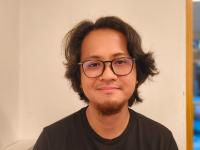
Beltran has written a biography of the founder of the Communist Party of the Philippines, which has just been translated into German (The Singing Detainee and the Librarian with One Book: Essays on Exile), whose supporters and non-supporters have been subjected to notorious "red-tagging" since the late 1960s. Jose Maria Sison, Joma for short, was also forced to leave the country and died in exile in the Netherlands in 2022, where Beltran had previously been able to visit him. From a European perspective, after the great communist "works of alienation" such as Koestler's Eclipse of the Sun or Sperber's Like a Tear in the Ocean, it is astonishing that communism still plays a role in the Philippines. But anyone who, like Beltran, has a mother who fought for more justice as a guerrilla fighter during the Marcos era and was tortured for it, may recognise the small and large injustices of Philippine society more clearly: on the one hand, it is the only country in the world where divorce is still illegal; on the other, people undergoing psychiatric treatment receive a discount card that also applies in cafés. Although there are good private clinics, ordinary citizens have to wait eight hours for minor treatment and therefore lose their daily income. The Philippines may be economically successful, but it is still one of the countries with the most striking social injustice. The fact that people still take up arms today is due to the sense of family and community in this region, Beltran explains. Because where this exists, there are also "movements" that unite more quickly than elsewhere.
Kafka is a good way to expand the boundaries of our languages
If you know the streets of a country, you know the country - as a friend once explained to me during a bus trip through Uganda. This also applies to the Philippines. Unlike Jagor, who took the boat to Bikol, a peninsula almost 400 kilometres away, I take the bus, a twelve hour journey. This is not because of the bus, but because of an absurdly small road constantly blocked by roadworks and seeming like a bad joke given the volume of traffic. The small road to the provinces is of course also political, Kristian Sendon Cordero explains to me after my arrival in Naga City late in the evening. It's a better way to control the province, which has always been insurgent. Cordero is a writer, filmmaker, translator and cultural activist. His cultural centre Savage Mind is a bookshop, cinema, gallery and café all in one.
But Cordero's work goes far beyond Naga City. The next day, we drive through the region in a pick-up SUV converted into a mobile library. Cordero tells us about "ghost villages", large empty houses built by Filipinos in the diaspora for a possible return - but above all, their size should make us forget how "small" life in the diaspora is.
Recycling art from the garden atelier - A podcast with Frank V. Peñones Jr.
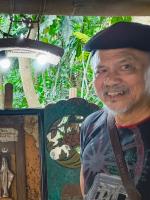
We visit Frank V. Peñones Jr. who, as a poet, translator, actor and visual artist, is one of the initiators of the literary renaissance in Bikol that continues to this day. A renaissance that has never had it easy, however: for example, Bikolano was abolished as a language in schools in 2024 because maths results were below the national average. Peñones tells me about his beginnings as an author and activist and about his current focus as a visual artist - works that are created in an open-air studio in Iriga City and consist mainly of recycled materials.
Sculptures, cars and paintings - A podcast with Cesar Gumba
Together with Peñones, we drive past the extinct Mount Iriga volcano, at the foothills of which Jagor conducted field research, and visit another artist, Cesar Gumba, who, in addition to large paintings and sculptures, is also working on an impressive fleet of cars and wants to bring back to life the "vintage car" that his father once gave him after he decided to pursue art against his parents' wishes.
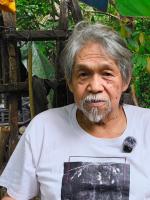
Gumba's art surrounds me in all its fascinating complexity a day later, as Cordero has organised a small panel discussion in the gallery of his cultural center.
With Mia Tijam, Dr. Mary Jane Guazon Uy and Trixie Adviento Odiamar, I talk in depth about the works of the authors and am once again amazed by the diverse and complex backgrounds of the literature discussed: colonial history and its echoes in the present are just as much a topic as the changing gender identities from pre-colonial times to the present, the ongoing armed resistance in the region and, of course, the history and languages of Bikol and their role within the Philippine linguistic diversity.
Past, present and future - A videocast with Mia Tijam, Dr. Mary Jane Guazon Uy and Trixie Adviento Odiamar
What opportunities arise from this diversity, Cordero explains to me after we have discussed his story Santiago's Cult, which was published on Literatur.Review at the beginning of August. The story - a brutal balancing act between tenderness and cruelty during the times of martial law under Marcos - was a long time ago for him; he is currently working on stories about other grey areas of violence and about how the introduction of confession changed the identity of the people of Bikol. By and large, he says, it's always about liminal limbo.
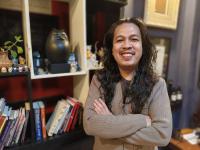
That sounds to me like his translation of Kafka's "Metamorphosis", which he not only translated into Bikolano, but also took the liberty of translating Gregor's insect babbling into another Bikolano language, Rinconada. It was a real pleasure to push the languages to their limits, explains Cordero, and particularly in the context of this story, so important to him because he has always been open to Kafkaesque literature without even knowing it at the time - for example when he listened to the Tale of the Girl and the Pineapple as a child.
Between Violence, language and sleep - A podcast with Kristian Sendon Cordero
When I finally ask him how he brings it all together - cultural activism, literature and then filmmaking, not to mention rebuilding his centre after last year's severe flooding - Cordero smiles: "We just have to get enough sleep and chew properly. People just don't sleep - and they don't chew properly."
It's a gamble to write in Filipino
Between slum, language, film and sound - A podcast with Ronaldo S. Vivo Jr.
At the end of my trip, I'm back in Manila - like Jagor - and once again sitting in an open-plan city office. This time, however, not in the CCP at Bebang Siy, but in the old wing of Makati City Hall, in the Department of Urban Planning. This is where one of the country's most successful authors, who consistently writes in Filipino, earns his money. However, explains Ronaldo S. Vivo Jr, author of the successful Dreamland trilogy, he didn't have much choice - even though writing in Filipino is a gamble. He first had to try self-publishing because no one wanted to publish such a work in Filipino. Vivo grew up in a family in the slums; his mother earned her money by selling duck eggs, his father as a decorator. Their house was full of Hong Kong films and a collection of Pacino and De Niro films, not to mention all the comics, and this was his actual role model for writing. He writes how to edit films, and the genres - martial arts, noir and hardboiled crime - have also influenced him.
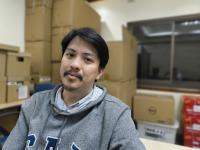
That the trilogy would become such a success was not foreseeable, even after the first self-publishing successes. Also because the books criticised the regime under Duterte and he had to defend himself against cyberattacks of all kinds; this is why he no longer operates any social media accounts. Until the success of his trilogy, he actually only made zero-budget short films and mainly played the drums for bands. What he still does today: psychedelic rock, post and death metal as well as hardcore punk - bands such as Basalt Shrine, Abanglupa, The Insektlife Cycle, Dagtum and Imperial Airwaves. This has now diminished because writing is taking up more time. He has started a new trilogy in which there is no longer so much swearing - there are, after all, a hundred ways to say "fuck" in Filipino, and swearing is part of everyday life in the slums, whether positive or negative - but in which Filipino history is the theme. The "Arson" trilogy, the first volume of which focuses on the unknown heroes of the revolution and the colonial era, will then also deal with American colonisation and the occupation by the Japanese. That too - of course - in Filipino. I think of Ngũgĩ's Decolonizing the Mind and how language decolonizes; and Vivo seems to confirm Ngũgĩ's thoughts when he tells of an evening in a reading circle whose members confessed to him that his work was the first book written in Filipino that they had read and discussed. And that they liked it too.
If I had stayed in the Philippines, I would be a different writer
Between old and new home - A podcast with Cecilia Manguerra Brainard
If I had one magical wish, I would give an old-school anthropologist like Fedor Jagor the chance to travel back in time to our present day. How would he deal with the encounters of this literary journey that followed his geographical traces, and how would he understand the concept of our globalised world today, which also involves people and authors leaving their country and becoming part of another culture? Like Cecilia Manguerra Brainard, who started writing as a young girl from an educated middle-class family in Cebu City and went to California as a young woman to study film - but ended up sticking with writing and becoming one of the most successful authors of the Filipino diaspora in the US. I reach her via a Zoom call at her home in Santa Monica, and despite the distance, the conversation is as close and intimate as with any author I've met on my trip.
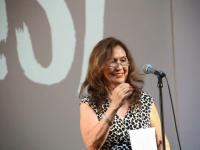
Despite the geographical distance, Brainard is always a Filipino author; she visits the country regularly. And her stories are always stories from Cebu - albeit written in English because she was brought up in English and not in Cebuano. Nevertheless, she is certain that she would be a very different author if she had stayed in the Philippines. She may not share the fate of Thomas Mann, whose time in exile had a lasting effect on his writing and thinking, but she is also a "PhilAm" author whose novels such as The Newspaper Widow interweave memory, colonial history and female self-determination and who has also had to deal with the blessings and curses of the American publishing world: sometimes wanted, then rejected again if the sales figures are not right. She is now at peace with this; her books have also been translated into numerous other languages. She is more concerned about the decline in "high literature", even if she herself acknowledges that the new, "fashionable" genres and their authors are certainly doing their best. But like Bebang Siy, Brainard says that the Philippines needs more "serious" literature in order to get a grip on the present and future with all its crises.
And perhaps also - as Justin, a student at the Polytechnic University, told me on my last day in Manila, in the legendary bookshop Solidaridad - a new concept of culture that could hark back to the pre-colonial era, when music and lectures were still free and open to all.
Did you enjoy this text? If so, please support our work by making a one-off donation via PayPal, or by taking out a monthly or annual subscription.
Want to make sure you never miss an article from Literatur.Review again? Sign up for our newsletter here.




